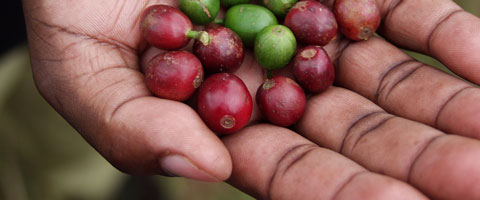Earth Care: by Yarden
One of the major problems in the coffee farming industry is mono cropping, which may lead to soil depletion, as well as destroys the biodiversity of a given region. A counteract to the agricultural mono cropping system is growing shade grown coffee, which presents trees of various native species, that creates an environment that attracts birds which are facing extinction. Shade grown coffee addresses environmental issues by insuring biodiversity, as well as local developmental issues.(Selling Forest Environmental Services, Market Based Mechanisms for Conservation and Development)
Fair Share:
What is a fair share? Coffee as it stands today is traded as a commodity on the New York stock exchange. When its price goes down, farmers suffer the cost of selling tonnage at a lower rate. This reality is virtually a non-factor in the health of relative currency and commodity traders, because if a good drops in price, it can be bought in larger quantities, and when its price rises it can be sold at a profit. The volatility of the market is a comfortable, diverse, economic jungle for the day trade explorer. Fair trade seeks to amend this system by systematically paying farmers more than the trading price, but the benefit of the price differential is questionable at best. Direct trade seeks to put even more money in to the farmers pockets. This could be revolutionary if all large coffee operations were dismantled and replaced with millions of small farms, or if the common coffee business model were small special coffee roasters, this however is not the case. The impact of direct trade today means a little more money for dozens of farmers. Macro economic issues seem to hold the key to improving the livelihoods of the larger demographic of coffee growers. If mono cropping is a major source of economic fragility then the diversification of agriculture in these nations can create economic security for the agriculture demographic. Diverse crop cycles would mean different seasonal intervals of income ; as well as the creation of subsidiary industries from fiber manufacturing to food production and export. Either local governments or the nations responsible for the colonization need to take the lead to invest in infrastructure training and the establishment of a variety of different industries to leverage crop failure, fluctuating labor markets which may limit the viability of mono crop GDPs.
People Care Alli
Mono cropping is not only a problem for soils and biodiversity, but also for coffee farming communities at large. Many coffee farming communities, in mostly poverty stricken areas, rely solely on coffee farming as income during peak seasons. Then, when coffee is not in season farmers must live on very little money and resources until the next crop. An ideal coffee production system would support farmers year round. Olympia Coffee Roasters are attempting to remedy some of these problems in the industry with their direct trade method. They visit coffee farms themselves, handpicking the best quality beans, and work with the farmers to improve the potential of the crops. Another very unique way that OCR is combatting the coffee industry standards is by paying the farmers 300% of the market value of that coffee, in respect to their “Quality of Life Company” motto. While there is still a lot of room for change and critiques to be made about first world consumption of third world goods, Olympia Coffee is paving a new path to ethical coffee production and trade.
People Care
Post Assigned to: Yarden, Alli, Mikko
Post Written by: Yarden
Post Edited by:
